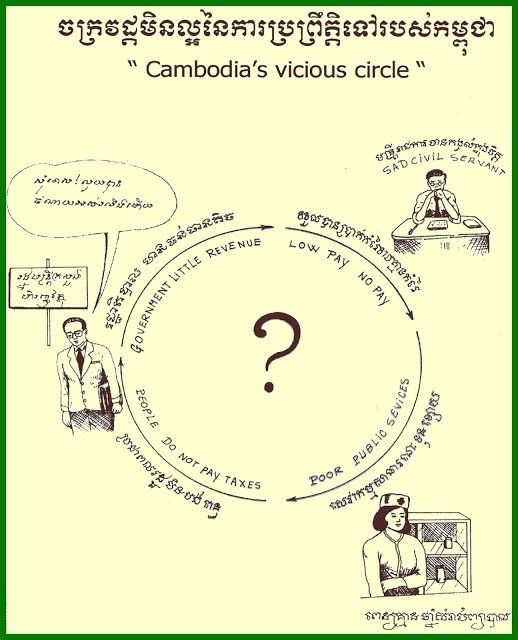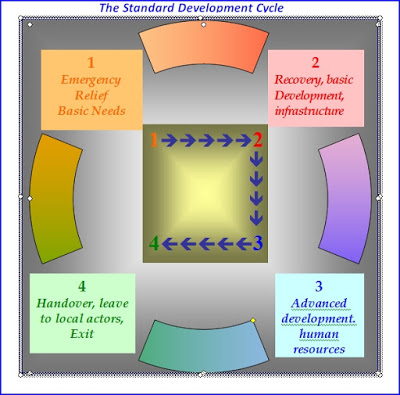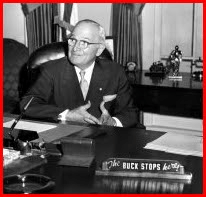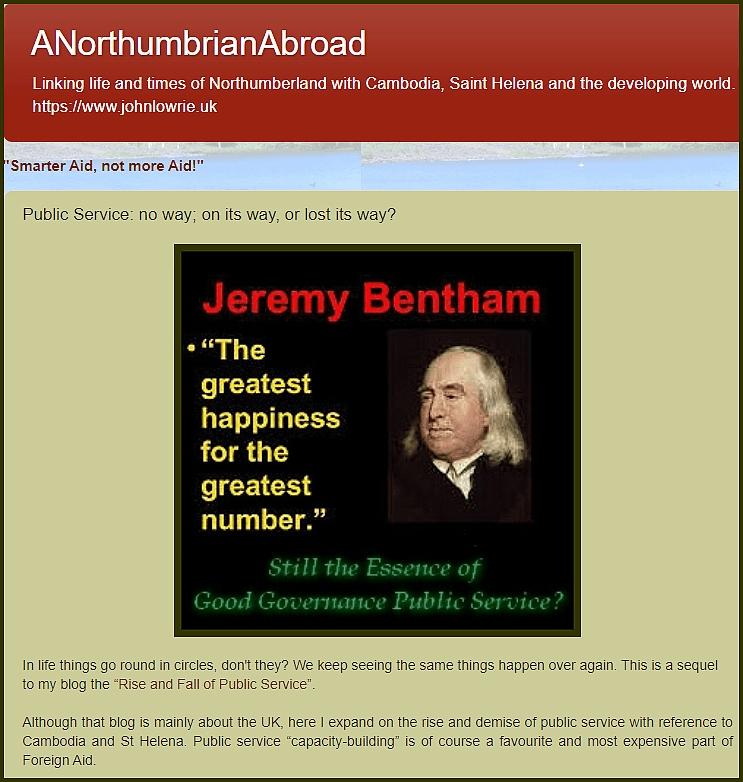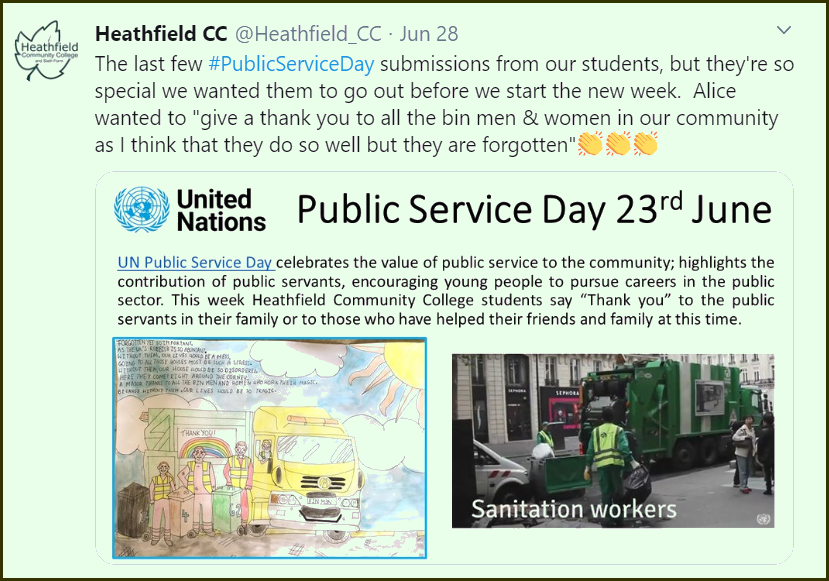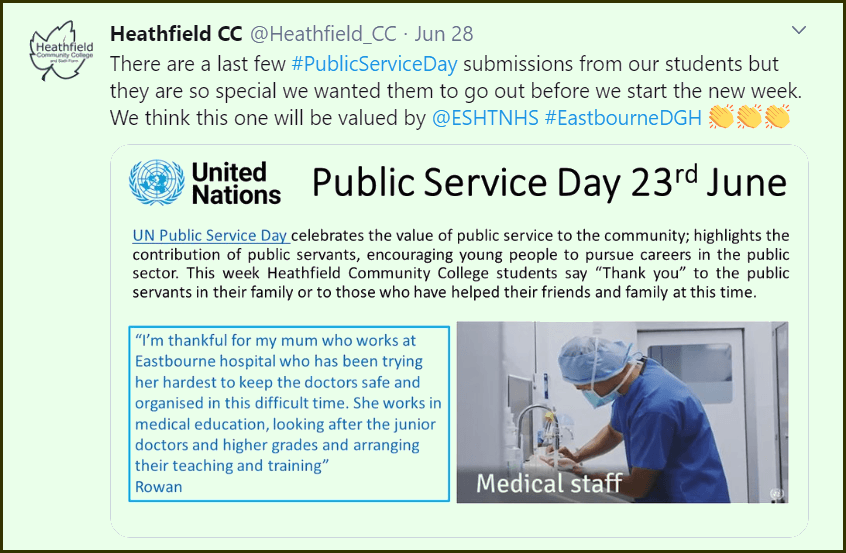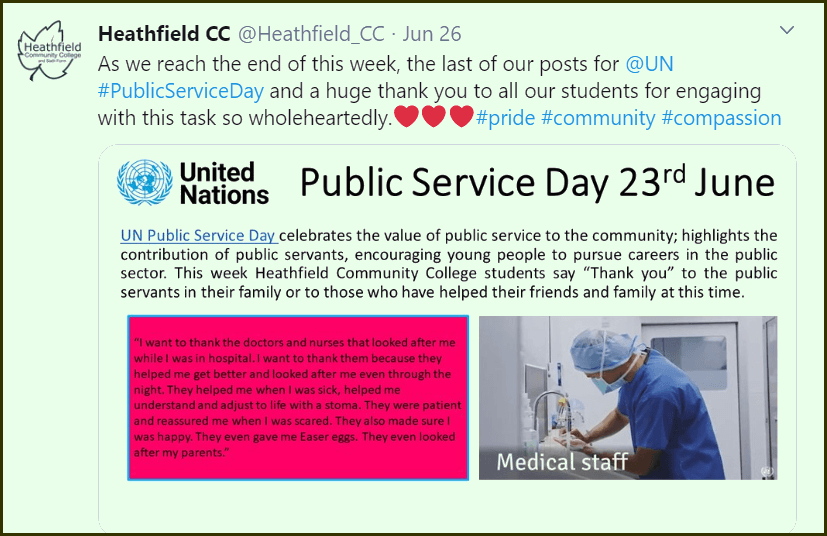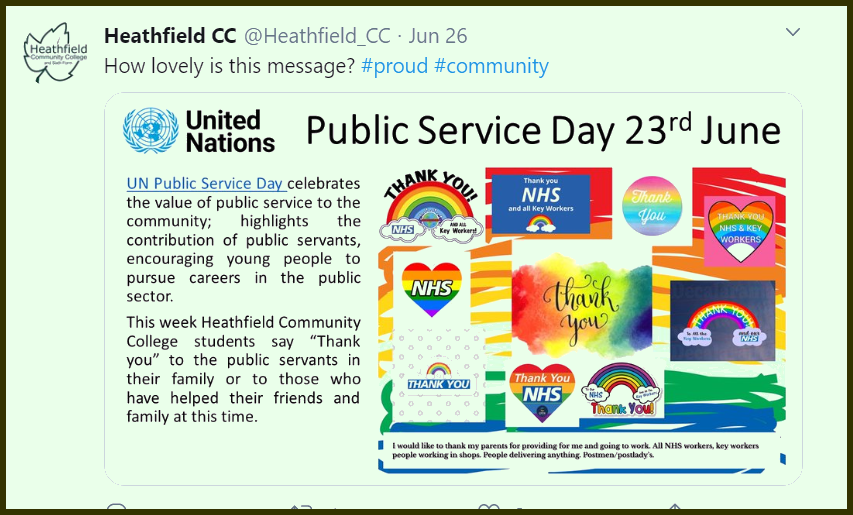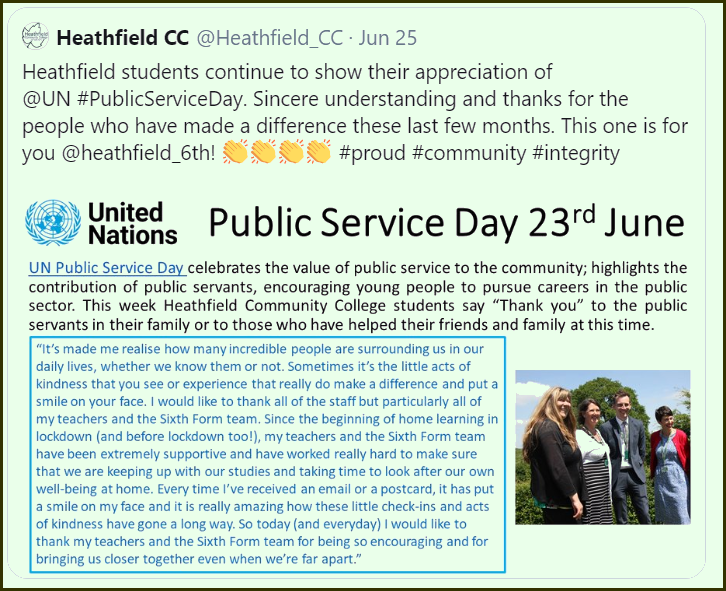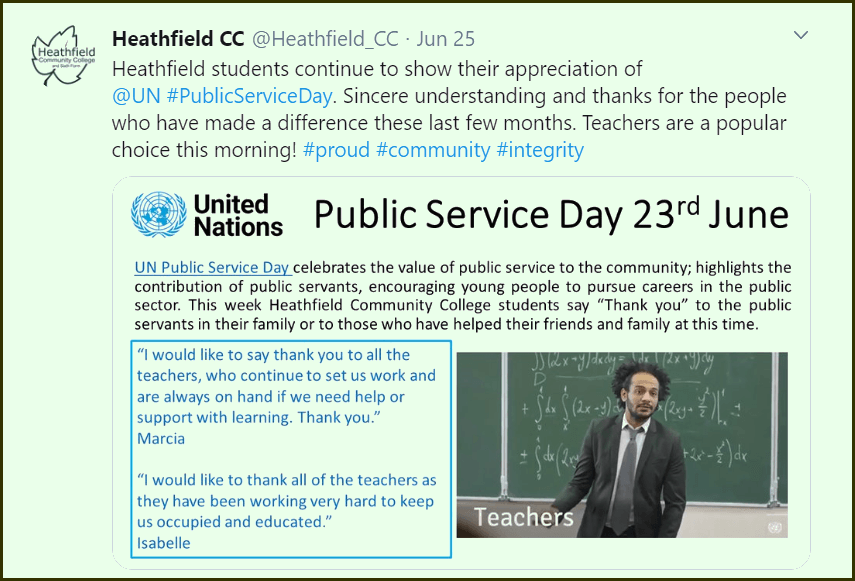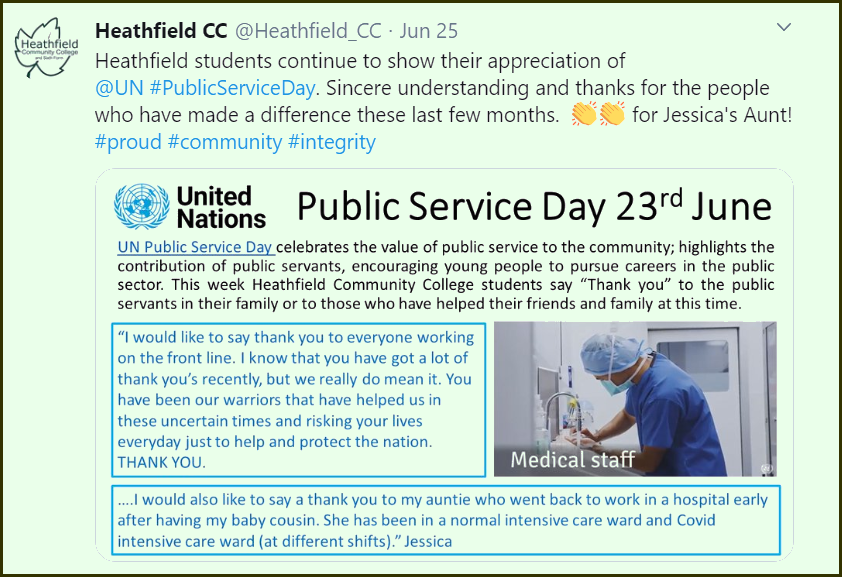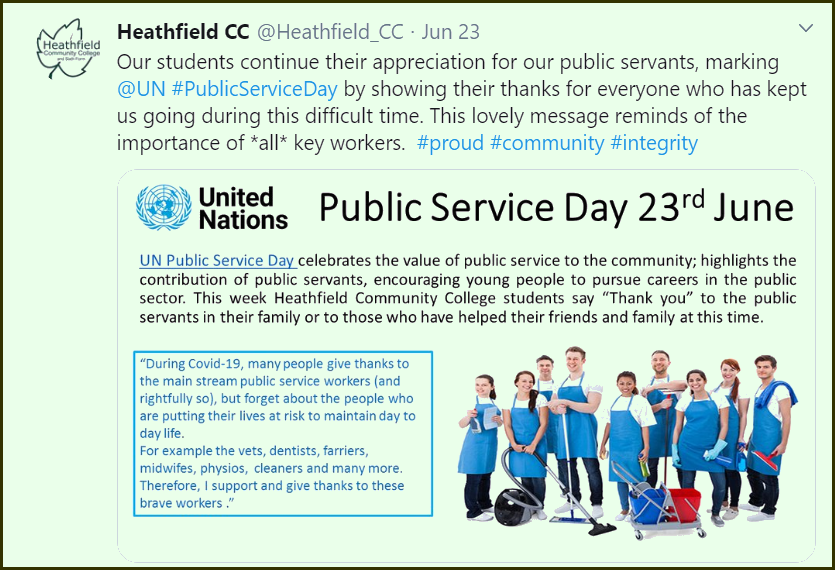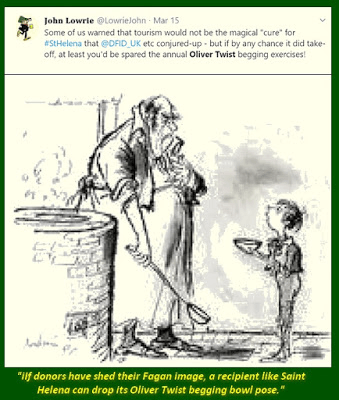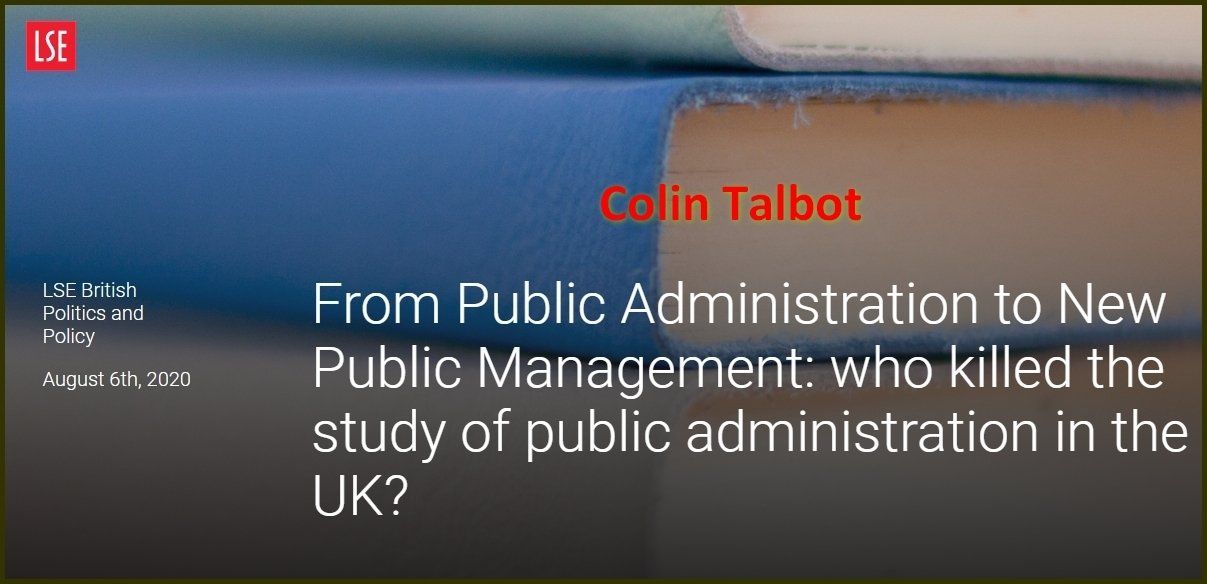Public Service - Do or Die!
The case for good worldwide public services
If the worldwide pandemic Covid19 has given us one lesson above others, it is the undoubted value of public service.
I was particularly disappointed when returning to the UK in 2016, after a lifetime abroad in aid and development, to see just how far the public sector had declined in quantity, quality and standing. In 2020, faith in it or at least in the UK's National Health Service (NHS), has been restored. If not for the NHS many more people would die because of Coronavirus.
I have fought against poor standards of public service in Cambodia that fail to provide the most basic of human rights. I've been responsible for projects to improve them. Cambodia has some excuse for poor services,- not as much as it claims - but wealthier countries like the UK have none.
This website story and my blogs are written to promote the case for better and more respected public service throughout the world.
The United Nations gives an admirable lead with Annual Pubic Service Day in June each year.
Good Governance
Good governance is neither hard to understand nor to put in to practice despite suggestions otherwise.
High-level professional training and skills are not necessary. No-one should be misled by situations portrayed as complex and requiring great expertise.
The truth is good governance boils down to simple common-sense and to knowing how best to mobilise and harness people. We can do this in three ways.
1. Consultation
Proper consultation should be the very minimum duty of public service officials when engaging with the public.
Often it's the first sacrifice or short cut "to get things done". It shouldn't be. "Free Prior and Informed Consent” described by the UN for the rights of the world's indigenous peoples sums up admirably how to go about it.
2. Participation
Participation is better than mere consultation. It means all relevant people should be involved actively in the design, preparation and operation of activities that affect their lives. Human nature is such is that when this is done they are more accepting of change even when there are adverse implications for them. You can't avoid at times having both winners and losers.
3. Empowerment
Participation is not done well if it is over-led from the top, pursued downwards, and controlled by external parties. That leads to sub-optimal outcomes that don't last beyond that artificial stimulation. Participatory processes can only be enhanced with actual ownership of the people affected who have vested interests in the changes being made. They should have formal roles.
The concept of self-help community groups consistently proves to work well in development projects. Oddly this way-of-working remains less prominent and funded compared to external expert-led “solutions”. Empowering people not only works for activities to improve lives but also for advocacy - to persuade others in charge or with influence to support beneficial changes.
Organisational Trickery
"Fraud isn't the disease itself; rather, it is a symptom of the larger disease of unethical organizational culture."
Dr. Attracta Lagan : Business Ethicist
Fraud takes many forms. It is not always financial in nature. People in public services can be as guilty of it as anyone else.
Here I want to mention briefly the tendency in governance to deny people a real choice. It's a kind of fraud and a deliberate tactic either to bring about a change that would not otherwise be welcome, or to maintain an unhealthy status quo despite justifiable reasons for improvements.
Usually the argument is "expert-driven" with statements like "there is no alternative" so decisions are pushed through.
Sometimes the fraud is more subtle. Artificial choices are given. People are led towards them.
This may be so on Saint Helena Island. People there are currently considering changes in governance with only two choices being offered. This is instead of time and effort being devoted to finding out, putting forward and considering many more options available. This is not for the first time. Previous similar exercises were conducted in the same "external expert-led" way. A lasting solution did not result, widespread dissatisfaction remained, what is there to suggest that this will happen again?
Another kind of fraud is where parties to certain issues resort to dogma. They push their own agenda and indicate that their way is the only right way when actually it might not be. We see this a lot in public planning processes. Conservationists can be very determined. As one case in Cambodia proved it is to the detriment of everyone concerned and in particular to vulnerable indigenous people.
It is easy to be critical of leaders like those in Cambodia but we must also acknowledge at times they don't have the best of examples to follow. One more aspect of good governance is a constant concern - conflicts of interests - still not well understood, probably deliberately so. Whistle-blowing is still an occupational hazard.
A right decision in public service can never be made in the wrong way.
Tales of good governance over over the years
Click on the button for the story
▼
Moral Authority
There is nothing more damaging to the image of public service than if people in it do not comply with the best standards.
I joined public service in 1974 in UK local government, where the most apt clause governing conduct and performance was Paragraph 80 of our terms and conditions of employment. It's been replaced by a more concise form today but I do recognise its words in the Welsh Local Government Code of Conduct. Here are some extracts:
"The public is entitled to expect the highest standards of conduct."
"Officials must not allow their own personal or political opinions to interfere with their work."
"Must use public funds entrusted to them in a responsible and lawful manner."
"Must not utilise property, vehicles or other facilities of the authority for personal use."
"Must not allow their own personal or political opinions to interfere with their work."
"Should deal with the public, members and other employees sympathetically, efficiently, and without bias."
(The full code is appended below.)
A self-evident truth is "trust and confidence are hard-earned but easily forfeited".
My job in those days, today we're called "Human Resources" professions, was to uphold those standards. They were ingrained in us. I was involved as the technical advisor in disciplinary hearings for many years. I have been responsible for the most serious of misconduct ever since throughout my career. Almost my last act in full-time professional work in Cambodia was to dismiss a senior manager for gross misconduct. It wasn't the worst case but just one of far too many. Some cases have even found their way from Cambodia to Washington and Whitehall. One posed a question or an epitaph for me.
http://anorthumbrianabroad.blogspot.com/2020/09/public-service-no-way-on-its-way-or.html#more
* Contributions of students of Heathfield School Sussex for Public Service Day 2020
▼
Please click on the picture to go the tweets and to access more from the students.
It would be good for this exercise to be replicated in many schools next year.
More Reading
Planning Public Services
Planning of development the worldover is an area mpacting on potentially most people while giving ample scope for greatest abuse.
APPENDIX
CODE OF CONDUCT FOR QUALIFYING EMPLOYEES OF RELEVANT AUTHORITIES IN WALES
General Principles
1. The public is entitled to expect the highest standards of conduct from all qualifying employees(6) of relevant authorities(7). The role of such employees is to serve their employing authority in providing advice, implementing its policies, and delivering services to the local community. In performing their duties, they must act with integrity, honesty, impartiality and objectivity.
Accountability
2. Qualifying employees of relevant authorities work for their employing authority and serve the whole of that authority. They are accountable to, and owe a duty to that authority. They must act in accordance with the principles set out in this Code, recognising the duty of all public sector employees to discharge public functions reasonably and according to the law.
Political Neutrality
3. Qualifying employees of relevant authorities, whether or not politically restricted(8), must follow every lawfully expressed policy of the authority and must not allow their own personal or political opinions to interfere with their work. Where qualifying employees are politically restricted (by reason of the post they hold, the nature of the work they do, or the salary they are paid), they must comply with any statutory restrictions on their political activities.
Relations with members, the public and other employees
4. Mutual respect between qualifying employees and members is essential to good local government, and working relationships should be kept on a professional basis.
5. Qualifying employees of relevant authorities should deal with the public, members and other employees sympathetically, efficiently, and without bias.
Equality
6. Qualifying employees of relevant authorities must comply with policies relating to equality issues, as agreed by the authority, in addition to the requirements of the law.
Stewardship
7. Qualifying employees of relevant authorities must ensure that they use public funds entrusted to them in a responsible and lawful manner, and must not utilise property, vehicles or other facilities of the authority for personal use unless authorised to do so.
Personal Interests
8. Whilst qualifying employees' private lives are their own concern, they must not allow their private interests to conflict with their public duty. They must not misuse their official position or information acquired in the course of their employment to further their private interests, or the interests of others. In particular, they must comply with:
(1 any rules of their relevant authority on the registration and declaration by employees of financial and non - financial interests,
(2) any rules of their relevant authority on the declaration by employees of hospitality or gifts offered to or received by them, from any person or organisation doing or seeking to do business, or otherwise benefiting or seeking to benefit from a relationship with the authority. Qualifying employees must not accept benefits from a third party unless authorised to do so by their relevant authority.
Whistleblowing
9. In the event that a qualifying employee becomes aware of activities which that employee believes to be illegal, improper, unethical or otherwise inconsistent with this Code, the employee should report the matter, acting in accordance with the employee’s rights under the Public Interest Disclosure Act 1998, and with the relevant authority’s confidential reporting procedure, or any other procedure designed for this purpose.
Treatment of Information
10. Openness in the dissemination of information and decision making should be the norm in relevant authorities. However, certain information may be confidential or sensitive and therefore not appropriate for a wide audience. Where confidentiality is necessary to protect the privacy or other rights of individuals or bodies, information should not be released to anyone other than a member, relevant authority employee or other person who is entitled to receive it, or needs to have access to it for the proper discharge of their functions. Nothing in this Code can be taken as overriding existing statutory or common law obligations to keep certain information confidential, or to divulge certain information.
Appointment of Staff
11. Qualifying employees of relevant authorities involved in the recruitment and appointment of staff must ensure that appointments are made on the basis of merit. In order to avoid any possible accusation of bias, such employees must not be involved in any appointment, or any other decisions relating to discipline, promotion or pay and conditions for any other employee, or prospective employee, to whom they are related, or with whom they have a close personal relationship outside work.
Investigations by Monitoring Officers
12. Where a monitoring officer is undertaking an investigation in accordance with regulations made under section 73(1) of the Local Government Act 2000(9) a qualifying employee must comply with any requirement made by that monitoring officer in connection with such an investigation.








